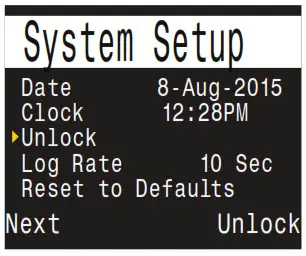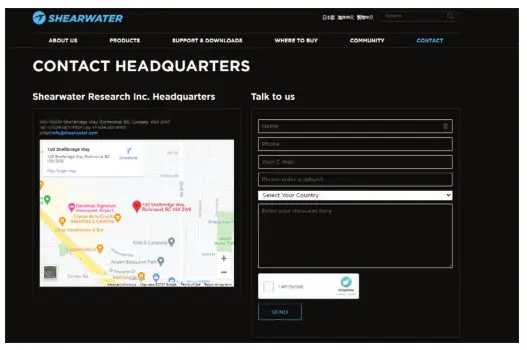DCIEM OPERATING INSTRUCTIONS
DANGER
Shearwater dive computers are capable of calculating decompression stop requirements. These calculations are at best a guess of real physiological decompression requirements. Even when following computer directions exactly, there is a risk of decompression sickness causing injury or death. Dives requiring staged decompression are substantially riskier than dives that stay well within no-stop limits.
YOU REALLY ARE RISKING YOUR LIFE WITH THIS ACTIVITY.
WARNING
Shearwater computers have bugs. Although we haven’t found them all yet, they are there. It is certain that there are things that our computers do that either we didn’t think about or planned for them to do something different. Never risk your life on only one source of information. Use a second computer or tables. If you choose to make riskier dives, obtain the proper training and work up to them slowly to gain experience.
Your computer will fail. It is not whether it will fail but when it will fail. Do not depend on it. Always have a plan on how to handle failures. Automatic systems are no substitute for knowledge and training.
No technology will keep you alive. Knowledge, skill, and practiced procedures are your best defense (Except for not doing the dive, of course).
DCIEM Decompression Algorithm
CautionThis document is not a complete reference or a substitute for professional training. Read your dive computer’s operating instructions prior to use and never dive beyond your training. What you don’t know can hurt you.
What is DCIEM?
The DCIEM 1983 decompression model is a serial, 4 compartment decompression model used by many naval, governmental, commercial, and scientific divers around the world. In the DCIEM model, only the first tissue compartment is exposed toambient pressure. Tissue tension diffuses into each adjacent tissue compartment, and critical supersaturation ratios in the first two compartments control decompression requirements.
The DCIEM model was developed by the Canadian Defense and Civil Institute of Environmental Medicine, now renamed Defense and Research Development Canada (DRDC Toronto). The model has been extensively tested with working divers in cold water using Doppler ultrasonic bubble monitoring. While the model was not designed to be bubble-free, it is comparatively well-validated and considered by many experts to be safer than other decompression models.
Shearwater has worked closely with DRDC Toronto to ensure our DCIEM algorithm implementation is true to their model. We would like to give credit and thanks to DRDC for their work on developing the DCIEM decompression model but note that they are not responsible for our implementation of the algorithm.
For more information about the DCIEM model and its rigorous validation we recommend the book “Deeper Into Diving, 2nd edition” by John Lippmann & Dr. Simon Mitchell.
Computer Behavior
Shearwater computers using DCIEM operate in largely the same way as they do when running any other decompression algorithm, though some info row displays will differ. DCIEM is currently available for the Perdix, Petrel 2, Peregrine, and NERD 2. For basic dive computer instructions, please see the primary operating instructions manual for your model of computer.
DCIEM is currently only available in single gas open circuit Air and Nitrox modes with a maximum oxygen fraction of 40%. Multi-gas accelerated decompression and closed-circuit diving are not currently supported.A DCIEM indicator is displayed above the current oxygen fraction on the home screen when DCIEM is enabled.
Divers who are accustomed to other decompression algorithms may be surprised at the conservatism of the DCIEM algorithm. The built-in NDL and decompression planners will run DCIEM when enabled. This is a good tool for understanding the effects of the algorithm on NDL and decompression requirements.
DCIEM SetupAn additional unlock fee is required to use the DCIEM algorithm. Contact your Authorized Shearwater Dealer for more information on obtaining an unlock code.
To unlock DCIEM on your dive computer, enter the unlock code in System Setup > System Setup > Unlock. Your computer will restart, and all tissue information will be reset. Manage repetitive diving accordingly. Enable DCIEM in the System Setup > Deco Setup menu.
Enable DCIEM in the System Setup > Deco Setup menu.
CautionChanging to DCIEM from another algorithm will reset the computer into Air diving mode if the current mode is unsupported and decompression tissues will be cleared. Plan repetitive dives accordingly.
FAQDo I need any special training to use the DCIEM algorithm?No, if you are certified diver comfortable using a dive computer you should not notice a practical difference in how the dive computer operates. The DCIEM algorithm is more conservative than some other algorithms, so it’s important to plan your dives and prepare accordingly. The built-in dive planners are useful tools for dive planning with DCIEM.
Will the computer tell me my repetitive group and repetitive factor? No, Shearwater’s DCIEM implementation does not produce repetitive groups or repetitive factors. These are components of the DCIEM table system. There is no currently validated way to determine these values algorithmically.
How does a DCIEM computer manage repetitive diving?Like all dive computers, tissue compartment tensions are continuously tracked and updated, even when the computer is ‘off’. Due to this continuous tracking, there is no need to calculate repetitive groups of factors. However, as is standard practice in computer diving, each diver must use the same dive computer for every dive, and dive computers cannot be shared between dives. What are the advantages to using a DCIEM computer over DCIEM tables? There are many advantages to using a dive computer instead of dive tables. Some examples include:
- Continuously calculated tissue tensions. This means that the diver gets credit for multilevel diving which can dramaticallyincrease the amount of available dive time in a day when compared to running square profiles.
- More flexibility during decompression, crediting the diver for sub-optimal decompression stops that occur at deeper depths due to environmental conditions.
- Automatic electronic logging of dives reduces the need to manage paper logs.
- Simplified dive planning. Built-in NDL and decompression planners make planning dives and required surface intervals easy.
What does the Nitrogen Loading Bar graph represent when running the DCIEM algorithm? The nitrogen loading bar graph is a representation of the decompression stress a diver is under according to the DCIEM algorithm. It is calculated based on the supersaturation ratios of the model’s compartments.
The nitrogen loading bar graph is a representation of the decompression stress a diver is under according to the DCIEM algorithm. It is calculated based on the supersaturation ratios of the model’s compartments.
No-decompression limit is not a good predictor of decompression sickness risk. The nitrogen loading bar graph is a much better tool for managing this risk.
What does the tissue loading bar graph represent when running the DCIEM algorithm?
The tissue loading bar graph shows loading of the 16 Bühlmann ZHL-16C tissue compartments, exactly like it does when running the Bühlmann decompression algorithm.
We chose to leave this graph in place while the computer is running DCIEM for interest and so tissue loading could be compared. The tissues represented in this graph have no impact on decompression calculations when running the DCIEM algorithm.
Can I revert my computer to the Bühlmann ZHL-16C algorithm after upgrading it to DCIEM?Yes, once a computer is DCIEM unlocked it can be freely switched between algorithms.Note that changing algorithms will clear decompression tissues. Plan repetitive dives accordingly.
Why did we limit our DCIEM implementation to a single open-circuit gas of up to 40% oxygen? Will we introduce multi-gas and helium-capable DCIEM in the future?
This implementation is designed to cover the majority of use cases for the DCIEM algorithm. We may introduce additional capabilities or features in the future depending on market demand. We always appreciate getting feedback from fellow divers about how we can make our products better.
Shearwater Research Inc.Headquarters100-10200 Shellbridge Way,Richmond, BCV6X 2W7Tel: +1.604.669.9958[email protected] www.shearwater.com
www.shearwater.com www.facebook.com/DiveShearwater
www.facebook.com/DiveShearwater www.youtube.com/shearwaterresearch
www.youtube.com/shearwaterresearch
DCIEM Decompression AlgorithmDOC. 10055-RevA (2021-07-21)
References
[xyz-ips snippet=”download-snippet”]

